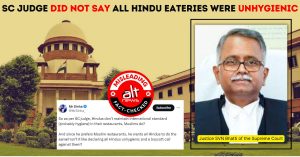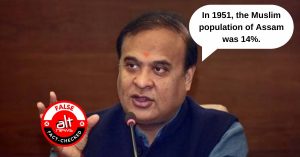From time to time, different types of claims regarding the Jain community circulate on public forums, online communities and social media. The reach of these claims is so wide that they are mentioned in business summits, study material for government job examinations, so-called case studies and research papers, and news reports and bulletins, and are also promoted by politicians. One of these claims is that the Jain community contributes more than 24 percent to the total tax collected in India. This claim has been circulating for years, which also states that though Jains constitute 0.4 percent of the whole population, they have a 24 percent contribution to the total income tax.
According to a report by The Hindu dated August 2007, while inaugurating the Chennai chapter of the Jain International Trade Organization (JITO) on August 19, 2007, former BJP MP Pushp Jain from the Pali Lok Sabha constituency of Rajasthan, said while Jains formed a little less than 1 percent of India’s population, their contribution to the exchequer through income tax was an astounding 24 percent.

Vivek Bindra also claimed that in 2009, the Jain community contributed 42 percent to the total income tax collected in India.
Study IQ IAS, a digital platform claiming to prepare aspirants for government jobs like the UPSC, CSE, SSC, State PSC, UGC NET, Railways, etc., also made the same claim in a video dated October 2022.
News18 anchor Amish Devgan made a similar claim in two of his TV segments. Videos of both were uploaded on YouTube on January 4 and January 6.
In a byte given to India TV in for a bulletin in January this year, pro-BJP poet Anamika Jain Amber also made the same claim.
That same month, Manoj Muntashir Shukla also made a similar claim in a video while talking about the Jain community. Manoj presented this claim as a fact in the video.
A study authored by Kiran CM in the International Journal of Applied Research’s VOL. 6, ISSUE 3, PART D (2020) also carried the same claim.

A similar claim was made by Varinder Bansal, former research & corporate editor, CNBC India and founder, Omkara Capital, in a September 2022 tweet.

Fact Check
Since this claim has been circulating from a period before the 2011 Census, Alt News first checked the population data on the basis of religion from the 2001 Census to verify the population of Jains in the country. According to the Religion Data Report of the 2001 Census available on the official portals of Census India and the Linguistic Survey of India, the population of Jains at that time was 0.4 percent of the total population of the country.

We found a press release published by the Press Information Bureau in 2015. Based on the data released by the Registrar General and Census Commissioner, it states that in the 2011 Census, the population of Jains was 0.4 percent of the total population of the country.

No ‘Religion’ Field in Income Tax e-filing Portal Registration Form
Alt News completed all the steps needed to register an individual account on the Income Tax website and found that there was no field for religion in the form. After an account has been registered, there is no information which pertains to the holder’s religion.
On searching the Income Tax website, we could not find any religion-related data to confirm that Jains contribute 24 percent of the total income tax of this country. Data on direct tax collections, break-up of tax collections by states and union territories, contribution of direct taxes to overall tax collections, etc. between the period of FY 2000-01 and 2018-19 are available on the Income Tax website. However, there is no information pertaining to tax collection on the basis of religion anywhere here.

We found a data assessment of income tax returns for the Financial Year 2018-19 on the Income Tax website. Though it contains income tax data on the basis of status, there is nothing that pertains to tax contribution by religion.

It is worth noting that a term known as HUF has been used on the basis of income tax collection by status. HUF refers to Hindu Undivided Family. As per the information available on the Income Tax website:
- Hindu Undivided Family (‘HUF’) is treated as a ‘person’ under Section 2(31) of the Income Tax Act, 1961. HUF is a separate entity for the purpose of assessment under the Act.
- Under Hindu law, a HUF is a family consisting of all persons lineally descended from a common ancestor and includes their wives and unmarried daughters. A HUF cannot be created under a contract. It is automatically created in a Hindu family.
- Jain and Sikh families are not governed by Hindu law, but they are treated as HUF under the Act.

However, the HUF status mentioned in the assessment data does not provide data on income tax collection by any specific religion (Hindu, Sikh, Jain).
For more information, we submitted a question to the Income Tax Department via Right to Information (RTI) asking whether the Income Tax Department ever released income tax data on the basis of religion. If so, we inquired whether Jains did indeed contribute 24% to the total income tax of the country. To this, the Income Tax Office responded, ‘N.A.’. In other words, ‘not answerable’.

Since the answer to Alt News’ RTI was not clear, we filed the first appeal and sought a clearer answer. This time, giving a clear answer to our questions, the Income Tax Office said that it does not maintain this type of information (religion based, caste based and creed based).

To sum it up, a misleading claim about the Jain community contributing 24 percent to the total income tax collected in India has been circulating for several years on different forums and platforms. However, in reality, the Income Tax Department does not record or release data on income tax collection on the basis of religion, caste, or creed. This claim is completely false.
Independent journalism that speaks truth to power and is free of corporate and political control is possible only when people start contributing towards the same. Please consider donating towards this endeavour to fight fake news and misinformation.






